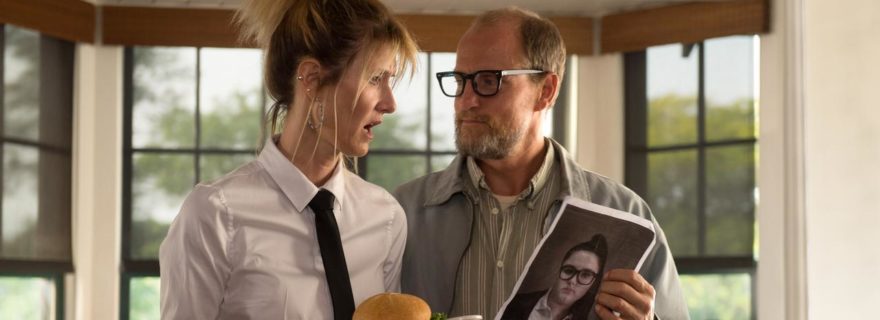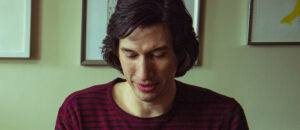'Wilson'
Movie Rating:
3
Daniel Clowes is one hell of a writer in the arena of graphic novels, but his tone is incredibly tricky to translate to film. ‘Ghost World’ may have been a Clowes movie masterpiece, but other adaptations of his work have been less than satisfying. ‘Wilson’ is easily one of Clowes’ best comics and also one of his best movies, not that the latter is much of a compliment.
As a graphic novel, ‘Wilson’ was comprised of a series of single-page comics, each done in a slightly different art style. Eventually, a narrative emerged about modern alienation from an endlessly punished (often justifiably so) middle-aged misanthrope. The title proved to be one of Clowes’ most satisfying books. The mixture of brightly funny comic imagery with a downbeat and unsettling narrative was both oddly moving and caustically funny.
Of course, it didn’t have anything resembling a three-act narrative. Even though Clowes himself adapted the book into a screenplay, forcing ‘Wilson’ into a movie is a somewhat awkward proposition. The film tries and can be a pretty damn amusing experience whenever the episodic production focuses on bringing the book to life and not cramming it into a standard movie structure.
Woody Harrelson stars as the title character and his casting is close to perfect. Wilson is a lost soul who has no apparent profession and seems to dedicate his life purely to complaining and irritating those around him. (He’s the type of guy who will sit next to a stranger on the bus in a blatant attempt to form a friendship, and then end up mocking that person mercilessly over some minor difference in taste.) Things get a bit rough (even more than normal) for Wilson when his father dies, so he attempts to reconnect with some lost relationships from his past. That leads to his ex-wife, Pippi (Laura Dern). She’s a complete mess as well but is trying to rebuild her life by working as a waitress. Many years ago, she gave birth to a baby that Wilson believed she aborted, and put the child up for adoption. When Wilson learns about this, he insists that they track down the girl and discover who she is. The disaffected and sarcastic teen (Isabella Amara) immediately appeals to Wilson. His stalking turns into forming a fractured family based on mutual alienation and rejection. Somehow, Wilson finds a broken little family for himself. Obviously, it’ll all go wrong.
‘Wilson’ is a curious creation. It feels like a cousin to ‘Ghost World’, with the main character a far more abrasive version of Steve Buscemi’s misguided misfit. He has a certain lovable curmudgeonly charm, but his misanthropy isn’t treated as a magical virtue. He’s an asshole, just a self-aware asshole who is at least trying to be decent. That’s compelling, and Woody Harrelson adores the opportunity to rip into the role and play a bitter sad sack who only kind of means well.
The single-page strip origins of the story give the movie an episodic feel that, for a while, feels like a hit-or-miss punchline machine for Harrelson. Then the lost daughter narrative raises the stakes and provides momentum. Laura Dern’s messy character recalls her role in ‘Citizen Ruth’. They make a perfectly dysfunctional couple who deserve each other in ways both painful and sweet. Isabella Amara does an Enid-lite act well, and once the movie positions itself as a bleakly funny twist on the fractured family dynamics of a feel-good indie, it’s a fun ride.
‘Wilson’ provides familiar beats of a misanthrope-makes-good story, yet cleverly avoids the “makes good” part. Wilson’s grand tale of growth is occurring entirely in his head, while the world responds with a mixture of apathy, mild compliance and outright rejection. Like in the book, Clowes plays with a certain comedic archetype (think Larry David). However, he plays the character as a genuine mess. Wilson is hilarious until he’s infuriating and/or tragically lost.
Harrelson and Dern relish their roles and hit the right uncomfortable notes. Unfortunately, director Craig Johnson (‘The Skeleton Twins’) isn’t quite as in sync with the writer’s uniquely oddball tone as Terry Zwigoff was, so the film lacks the melancholic punch of ‘Ghost World’. Johnson does well with dark humor and shoots the movie in blindingly bright colors to give it a heightened graphic novel aesthetic that’s rather charming. Nevertheless, everything is just a little too broad and the characters are just a little too loathsome. While Zwigoff adored his gang of losers, Johnson is more apathetic about their plight. Had Alexander Payne directed ‘Wilson’ as planned, he likely would have given the dark comedy enough pathos and humanity to make these misfits tragically lovable. Sadly, Johnson can’t quite get there.
It doesn’t help that the screenplay diverts into an oddly uplifting ending that doesn’t quite feel right. The writing has shades of irony which suggest that the sappy final scenes should have some sting, but Johnson never delivers it. The book was more ambiguous, and felt more like ‘Ghost World’ in that it showed sarcastic misanthropy to be an emotional dead end. ‘Wilson’ goes for something more conventionally uplifting and it doesn’t work.
The tone of Daniel Clowes’ writing and its mixture of comedic exaggeration with crushingly relatable sadness and tragedy is incredibly difficult to get right on film. Thus far, it has only happened once. Had Alexander Payne made ‘Wilson’, it might have happened twice. We’ll never know. Unfortunately, only Craig Johnson’s ‘Wilson’ exists. Thankfully, Clowes’ humor and the mixture of self-delusion and social discomfort that make the character so compelling translate well through Woody Harrelson’s performance. There’s about an hour in the middle of the movie that’s fantastic. (Not coincidentally, it’s the section most closely adapted from the book.) That’s enough to make ‘Wilson’ the second best Daniel Clowes adaptation. It could be worse, but it also should have been better.



